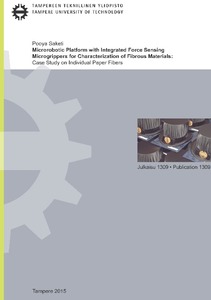Microrobotic platform with integrated force sensing microgrippers for characterization of fibrous materials: Case study on individual paper fibers
Saketi, Pooya (2015)
Saketi, Pooya
Tampere University of Technology
2015
Rakennetun ympäristön tiedekunta - Faculty of Built Environment
This publication is copyrighted. You may download, display and print it for Your own personal use. Commercial use is prohibited.
Julkaisun pysyvä osoite on
https://urn.fi/URN:ISBN:978-952-15-3550-5
https://urn.fi/URN:ISBN:978-952-15-3550-5
Tiivistelmä
Mechanical characterization of micro-scale fibrous materials determines the key parameters which affect the quality of products such as composites, textile and paper. The current laboratory tests are mainly based on bulk measurements. This thesis introduces a microrobotic platform to handle and to characterize micro-scale fibers (MF), with the dimensions of few micrometers to hundreds of micrometers, at individual fiber level. The platform facilitates handling and specimen preparation of micro-scale fibrous material. A major challenge in mechanical characterization of MF is lack of proper force sensing microgrippers in the market. MF do not need a lot of force to manipulate, but their ultimate tensile strength is high and relatively large forces are required to perform a micro-tensile test. In this thesis, three force sensing microgrippers are developed and they are integrated into the mentioned microrobotic platform. Two of them are developed to measure the bonding forces between individual pulp fibers, normal to the bonded area (Z-direction) and parallel to the bonded area (shear-mode). Their force sensing solution is based on bending polyvinylidene fluoride (PVDF) films and their force range is up to 10mN. The third one, with the force range of 20mN, is developed to perform micro-tensile tests on MF. It uses a microspring and a magnetic encoder to measure the force. The force range of this force sensing microgripper can easily be increased by changing its microspring to a stiffer one. This feature makes the proposed force sensing approach adaptable to a wide range of MF. Even though pulp and paper fibers are used as a case study in this thesis, the applications of microrobotic solutions presented here are not limited to pulp and paper fibers for the following reason: pulp and paper fibers are natural fibers with random morphology, therefore if a microrobotic solution is capable of handling these morphologically challenging fibers, it is easily adaptable to synthetic fibers which have uniform morphology. The prototypes of all three force sensing microgrippers are calibrated and their performance are validated.
Kokoelmat
- Väitöskirjat [4772]
